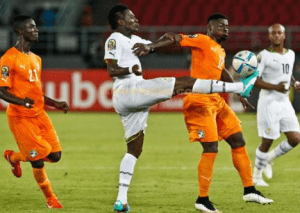Côte d’Ivoire vrs Ghana: A football-economics tale of two countries
 Côte d’Ivoire’s victory against Ghana during the 2015 African Cup of Nations final was widely unexpected and regarded as a historic victory. The Elephants, the Ivorian national football team, were certainly not the favourite team, but surprised most observers with a repeat of their victory against Ghana 23 years ago, again on penalty kicks.
Côte d’Ivoire’s victory against Ghana during the 2015 African Cup of Nations final was widely unexpected and regarded as a historic victory. The Elephants, the Ivorian national football team, were certainly not the favourite team, but surprised most observers with a repeat of their victory against Ghana 23 years ago, again on penalty kicks.
As an economist and a football fan, I cannot resist drawing a certainly nonlinear correlation between soccer and economic growth, and revisit a compelling parallel with the different economic trajectories the two countries have taken in the last decade and their performance in the most popular sport in the world. The relationship between the sport and economic performance has never been confirmed, although Goldman Sachs found an interesting relationship between World Cup victories and equity markets. According to their study, the victory outperforms the global market by 3.5% in the first month, yet such enthusiasm fades away in the coming months.
By all means, Côte d’Ivoire and Ghana are arguably two faces of the “Africa rising” narrative, with African economies emerging as leading poles of growth and prosperity, while distancing Africa from the often entrenched images of a continent of poverty, disease and despair. Ghana, the first sub-Saharan African country to claim its independence from a colonial power, has built arguably some of the best democratic institutions, yet the economy has struggled to pick up until recently. Across the border, post-independent Côte d’Ivoire emerged very rapidly as a regional economic leader in West Africa, thanks to a very dynamic and diversified economy.
In the past decade, however, the tide seemed to have turned in favour of Ghana, which emerged as a key point of entry for foreign direct investments in Africa. Its dramatically improved business environment and new oil sector helped boost the economy, making it less dependent on gold and cocoa exports.
Incidentally, I was posted to Ghana in 2005 and became an enthusiast of both Ghana’s economic miracle and national football team, the “Black Stars”. Since then the team has consistently placed itself among the top four countries in successive African football tournaments and reached the 2010 World Cup quarter-final after a remarkable extra-time victory against the United States. This period also marked the first discoveries of oil and the euphoria was just beginning.
Across the border, Côte d’Ivoire found itself in the middle of its “lost decade” of conflict, which sparked the move of the African Development Bank headquarters to its temporary home in Tunis. Many businesses moved their headquarters to neighbouring countries such as Ghana itself and Senegal, which replaced Côte d’Ivoire as the new regional hubs. Up to an extraordinary performance in 2006, the Elephants did not even pass the group stage for three consecutive editions of the African Cup of Nations.
A decade later, the tide seems to be turning once again. Côte d’Ivoire is in full recovery and leads the way as one of the fastest-growing economies in the world for two consecutive years. Building on a highly diversified economy and visionary leadership, Côte d’Ivoire is in full euphoria, banking on the historical return of African Development Bank to its headquarters and on the recent inauguration of the landmark HKB Bridge in Abidjan. As an AfDB employee now based in Côte d’Ivoire and covering the West African region, I could not hold back my enthusiasm at observing yet another symbol of “l’emergence ivorienne”, and my pride for the Bank’s key role as financier of this operation.
Across the border, Ghana is plunging into a vicious cycle of high spending, rising debt and currency depreciation. The “oil dividend” is yet to fully materialize and the country is plagued with frequent power outages. While Ghana has arguably great potential, it is in dire need of reform to adress its economic imbalances. Its growth rate in 2014 is expected to be nearly half of its neighbour and fellow African Cup finalist, Côte d’Ivoire.
Similar to the African Cup qualifications where Ghana had to confront what many consider to be the toughest qualifying group, Ghana has certainly been confronted with various exogenous challenges in its quest for economic development. However, just as their final loss in the African Cup of Nations final was to penalty kicks, the current economic difficulties are largely imputable to Ghana’s own mistakes.
Looking forward, it is not clear whether this victory will give a further boost to Côte d’Ivoire, as the previously mentioned study suggests, or to Ghana, who can still claim the match against its neighbour as one of its best performances. Besides the economic impact, football competitions are social events that reinforce a sense of national identity in many countries. A trophy or even a victory against a football heavyweight makes even the most merciless critic of his own country feel proud to be part of it. Such sense of unity in a still largely polarized country is probably what Côte d’Ivoire needs the most, to consolidate its economic growth and peace trajectory. While sentiment can take you only so far, in markets as in nation-building, the months ahead, including the handling of a peaceful election, will be the key goal Côte d’Ivoire needs to score, even if it comes to the final penalty kick.
By Emanuele Santi
Source: AfDB blogs
